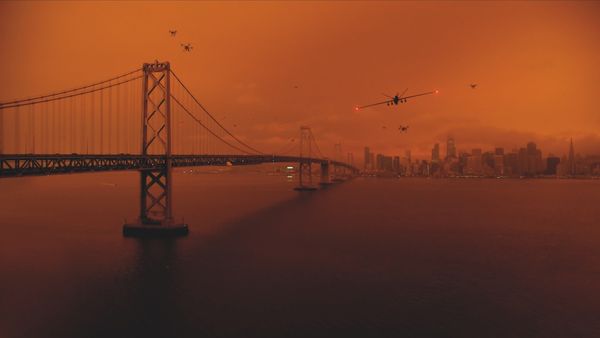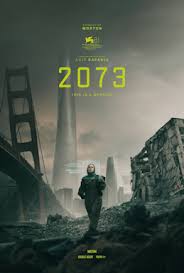Eye For Film >> Movies >> 2073 (2024) Film Review
2073
Reviewed by: Andrew Robertson

Borrowing from a variety of science fictional traditions, 2073 is ostensibly a warning from the future. It doesn't help its case that the future is already here, though, as is often attributed to William Gibson, 'it is differently distributed'. Samantha Morton provides narration and a performance of flattened affect well within her range as a survivor of some unspecified Event. There is reference to sci-fi comics I used to read but between the alleged year and the distance associated it is not clear what or when or how old those are.
To be honest it doesn't matter. There's been mention in the bumpf around the film of La Jetée, an experimental piece probably best known as an inspiration for Twelve Monkeys. The original postulated a closed loop of time, your archetypal bootstrap paradox, and while Terry Gilliam drew inspiration from it, he replaced that circle with a spiral. One whose course could be altered, not a rail but an orbit, somewhere that there was choice not at points but throughout.
Film is, of course, made of choices. Documentary even more so, and what and who are included is indicative. There's a mainstream of concern about activities, and while it's great to hear from journalists like Maria Ressa and Rana Ayub and Carol Cadwalladr, it is perhaps less radical to hear from voices like James O'Brien and George Monbiot. The film uses them and their work to talk about authoritarian movements, social media, the influence of 'think tanks' and 'dark money' and if it's news to you how news is made this may be revelatory. For anyone else it just doesn't go far enough.
There are two endings. After the credits, an interrogatory camera that borrows the breathing of Blade Runner's Voight-Kampff apparatus and the icy remove of Star Wars: A New Hope's Princess-interlocutor. Before then a statement that "it's too late for me," but crucially without a call to action. It's one thing to recognise that a future situation may be hopeless but it's cruel if not careless to suggest that it's inescapable. I kept waiting for the film to say "You are not alone," because our narrator is cut off from others by self and circumstance.
There are several moments where an assembly from stock footage and extant elements could be clever and many where it muddies messages. Samantha Morton's presence allows a moment from Steven Spielberg's version of Philip K Dick's Minority Report, but both stories involve some degree of subversion of prediction. Neither is correlated to discussions of software that allows prediction of subversion. There's some reference to Peter Thiel and his firm Palantir, but even though you see the cradled orb of its logo there's no reference to its roots in Tolkien, how that sphere of observation corrupts those who wield it. There's a heads-up display that uses numbers that seem like those of Nixie Tubes, a digital recreation of an incandescent age form of numerical display, one fed back to us by retro-futurism that itself feels now doubly-dated.
We bounce back and forth in time from 'The Event', which simultaneously "wasn't one thing," perhaps a borrowing from Gibson's notion of the 'Jackpot', and this fictional future. We spend time in 1990 in the collapse of the Soviet Union, of authoritarian impulses, on the financial crash of 2008 and the Brexit vote and the Trump election(s) and so forth. I kept wondering if the date was meant to be an echo of 1973, another of those September 11th turning points when Allende was deposed.
Instead, clips of Children Of Men with a swarm of quadcopters added, perhaps meant to be like the flies on a still life one assumes hangs in the moat-kept gallery, but instead feeling like gilding on lilies. Or perhaps 'guilt', because as much as 2073 mentions things, it digs no further. The Palantir is not considered, nor what it means that something like it is considered laudable. There's a slogan not used here that '1984 is not an instruction manual', but that ignores that many of those involved are not the kind to read instructions. Instead they'll take what bits they've got and hammer them together to resemble the cover art.
That collage approach can serve documentary well but a lack of focus means that 2073 feels like a laundry list of lamentation, a miscellany of misery. There is footage used that shows bodies, the aftermath of violence direct and indirect, all of which is distressing. There is footage from any number of conflict zones, a euphemism I use to cover a totality of totalitarian action. Within, without, between borders, an interzone of interventions, a parade of police actions.
There's some attempt at world building, a 'New San Francisco' that looks almost exactly like the current one, some reference to social scoring, a mention of the Chairwoman. AI that walk with eyes that glow exactly like the Final Cut of Blade Runner. There's talk of the suppression of the Uyghur, of Duterte's campaigns against all the opiates of the masses. There's mention of the commodification of attention but that's one of many places where detail isn't followed up.
Fundamental shifts in perception of value from labour that creates to leveraged debt that can consume aren't touched. That this comes out weeks after the killing of United Healthcare CEO Brian Thomson, mere days after Bashar Al-Assad's plane disappeared from radar on its flight from Syria. How each of those events are documented complicates whatever 2073 is trying to say in ways it struggles to match.
Director Asif Kapadia has had a varied career and 2073 is far from his best work. I admit that being as familiar with its subjects may be a disservice here. It is some feat to make something even halfway coherent from hundreds of sources. It is perhaps a mistake to have tried because this is territory that folk like Adam Curtis have more space and resource to explore. To focus on the breadth means that the depth is lost, and with every passing hour more details emerge that might strengthen the case the film is making if it had room to include them. History is a living thing, emerging as we move through it. There's discussion of how Cadwalladr was put at risk by lawsuits brought by a private individual and that immediately put me in mind of the McLibel trial and new information about how that was influenced, if not caused, by undercover officers of London's Metropolitan. A true measure of Thatcherism that, outsourcing the suppressive activities of the police state to private enterprise.
That I know that may mean that I'm the wrong audience for the film. I'm not sure how much value I would attach to it if I wasn't familiar, and this may be of use to some. I felt it did not work, its fictive elements felt forced and its factual elements felt fragile. Kapadia's documentary work has been better and though the film's subject is undeniably important I do not think this is the best way to present it. Present being the operative word, because it's hard to use an imagined future as a lens on the recent past without distortion. What 2073 lacks in depth it does not make up for with focus, and to that end I do not feel it is worth a look.
Reviewed on: 15 Dec 2024















